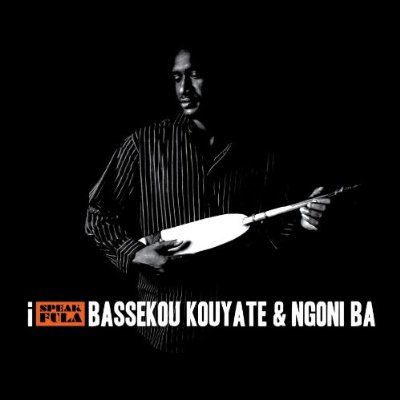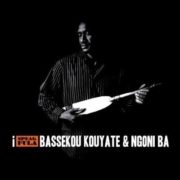BASSEKOU KOUYATE – I SPEAK FULA
ARTIST: BASSEKOU KOUYATE AND NGONI BA
TITLE: I SPEAK FULA
RELEASE DATE: 2010
LABEL: SUB-POP
 Are you happy?” inquires the tall imposing figure of Bassekou Kouyate at a concert earlier this year at the Getty. As if insecure about the effects of his music which should evoke this sense of elation, he repeats this question at the end of every other song. And as the set progresses, you decide, yes, I am happy, regardless of the language barrier and the actual content of each song. The layperson can appreciate the technique and the rolling wave of sound, not to mention the energy radiated by each of the musicians who go from stoic self-conscious performance to playful dancing and contagious smiles. Hints of 60s-era jamming weave in and out of the melodies which retain the griot spiritual sensibility. This is not uncommon in much of Malian music, and especially that of the stringed instrument variety.
Are you happy?” inquires the tall imposing figure of Bassekou Kouyate at a concert earlier this year at the Getty. As if insecure about the effects of his music which should evoke this sense of elation, he repeats this question at the end of every other song. And as the set progresses, you decide, yes, I am happy, regardless of the language barrier and the actual content of each song. The layperson can appreciate the technique and the rolling wave of sound, not to mention the energy radiated by each of the musicians who go from stoic self-conscious performance to playful dancing and contagious smiles. Hints of 60s-era jamming weave in and out of the melodies which retain the griot spiritual sensibility. This is not uncommon in much of Malian music, and especially that of the stringed instrument variety.
I Speak Fula is the follow up to Segu Blue, considered by some to be a groundbreaking recording in the area of root music connections between Western stringed instruments and their African beginnings. This recording is perhaps the current culmination of Kouyate’s talents as writer-musician and as continued purveyor of the Malian line of musical griots
Ngoni ba is both the name of the instrument and the band that surrounds Kouyate. The group is the result of his explorations and expansion of the original ngoni ba (big ngoni or large lute). Alongside Bassekou and Fousseyni Kouyate on ngoni ba are the ngoni bass of Moussa Bah, and Omar Barou Kouyate’s “medium” ngoni. The band also includes his vocalist wife, Amy Sacko; Alou Coulibaly on calabash (hollow gourd); and Moussa Sissoko on yabara (shelled and beaded hollow gourd) and tamani (hour glass-shaped talking drum).
The instrument itself looks unspectacular, resembling a short handled paddle or oar. However, the sound of a ngoni ba rings deep and wide like the Niger River of Kouyate’s homeland. That it is designated as being a large 4-stringed lute and also the direct ancestor to the western banjo explains, to a certain extent, the sound it generates. It possesses a fixed-pitch, unfretted drone string and is most commonly played via a five-note pentatonic scale, akin to American blues. And blues is often mentioned when describing the music of the instrument. One can also detect an air of the Appalachian as an unsurprising banjo-like intonation can be generated by the ngoni ba while the ngoni medium and ngoni bass can sound like any number of other familiar western stringed instruments. I Speak Fula gets this roots music tag, as in American roots, but one finds the percussion and the layering orchestration of the ngoni ba ensemble to be more in the folkier sound of 60s English folk and even into the early psychedelia of the American west coast. Extended jams bridge many of the songs which reference all of the above.
Even the theme of the recording seems to follow this 60s-ish ideology of tolerance and peace. Jamana Be Diya speaks of peace and progress and the elementary observation that fighting is bad. I Speak Fula itself is a statement that Kouyate speaks the language of a rival people in his village. It is both mocking and a proclamation of tolerance for people that must share the same land and country. Musow – For Our Women, is an homage to the women who care for the men and the families. It’s galloping pace is led by the calabash slapping of Coulibaly. And again it is redolent of the 60s spirit and perhaps even the momentum of a rollicking country song. Another guest, Baba Diabate, also joins in with the dunun (West African bass drum).
Kouyate has played or recorded with the numerous high profile artists on both the African continent and points west. Taj Mahal, Bela Fleck, Bonnie Raitt, Franz Ferdinand, and even Bono have joined him on various projects. Closer to home, Toumani Diabate, the legendary kora (harp lute) player has shared the stage and several recordings with Kouyate. On I Speak Fula, Toumani, along with soku fiddler, Zumana Tereta, and Vieux Farka Toure on guitar enrich the already vibrant sound of Ngoni ba. Although descriptions and attributes of Kouyate’s sound reference western roots music in execution, the heart and soul of I Speak Fula is very Malian and expands as it perpetuates the songs of griot tradition.
Joel Okida is a struggling artist, struggling writer, and struggling musician. It occurs to him that life is all about the struggle. Fortunately, he did not take up acting. However, he’s not half-bad as a zydeco dancer and the ability to make a mean gumbo and lovely walnut tortes has gotten him by.













